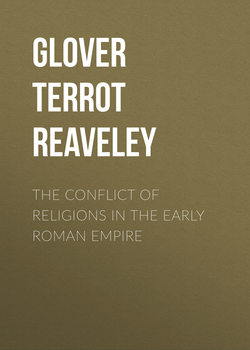The Conflict of Religions in the Early Roman Empire

Реклама. ООО «ЛитРес», ИНН: 7719571260.
Оглавление
Glover Terrot Reaveley. The Conflict of Religions in the Early Roman Empire
PREFACE
CHAPTER I. ROMAN RELIGION
CHAPTER II. THE STOICS
CHAPTER III. PLUTARCH
CHAPTER IV. JESUS OF NAZARETH
CHAPTER V. THE FOLLOWERS OF JESUS
CHAPTER VI. THE CONFLICT OF CHRISTIAN AND JEW
CHAPTER VII "GODS OR ATOMS?"
CHAPTER VIII. CELSUS
CHAPTER IX. CLEMENT OF ALEXANDRIA
CHAPTER X. TERTULLIAN
Отрывок из книги
On the Ides of March in the year 44 B.C. Julius Cæsar lay dead at the foot of Pompey's statue. His body had twenty three wounds. So far the conspirators had done their work thoroughly, and no farther. They had made no preparation for the government of the Roman world. They had not realized that they were removing the great organizing intelligence which stood between the world and chaos, and back into chaos the world swiftly rolled. They had hated personal government; they were to learn that the only alternative was no government at all. "Be your own Senate yourself"[1] wrote Cicero to Plancus in despair. There was war, there were faction fights, massacres, confiscations, conscriptions. The enemies of Rome came over her borders, and brigandage flourished within them.
At the end of his first Georgic Virgil prays for the triumph of the one hope which the world saw – for the preservation and the rule of the young Cæsar, and he sums up in a few lines the horror from which mankind seeks to be delivered. "Right and wrong are confounded; so many wars the world over, so many forms of wrong; no worthy honour is left to the plough; the husbandmen are marched away and the fields grow dirty; the hook has its curve straightened into the sword-blade. In the East, Euphrates is stirring up war, in the West, Germany: nay, close-neighbouring cities break their mutual league and draw the sword, and the war-god's unnatural fury rages over the whole world; even as when in the Circus the chariots burst from their floodgates, they dash into the course, and pulling desperately at the reins the driver lets the horses drive him, and the car is deaf to the curb."[2]
.....
Horace's "conversion" is recorded in one of his odes, but it may be taken too seriously.
That superstition so gross was accompanied by paralysing belief in magic, enchantment, miracle, astrology[68] and witchcraft generally, is not surprising. The historians of the Early Empire have plenty to say on this. It should be remembered that the step between magic and poisoning is a very short one. Magic, says Pliny, embraces the three arts that most rule the human mind, medicine, religion and mathematics – a triple chain which enslaves mankind.[69]
.....